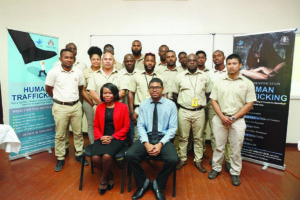A majority of the 68 cases of human trafficking recorded by the Guyana Police Force from January to May of 2018 were Latin American nationals, with Venezuelans heading the list.
This revelation was made by acting Coordinator of the Ministerial Task Force on Trafficking In Persons (TIP), Oliver Profitt on Tuesday, who explained that the alleged victims are mostly adults.
Profitt, who spoke to media operatives on the sidelines of a training exercise for officers of the Guyana Geology and Mines Commission (GGMC), said this issue is being closely monitored.
“Most of our foreign alleged victims are from Latin American countries. The Dominican Republic was showing up a lot before, Brazil was showing up too. But now we are seeing more Venezuelans.”

In the US (United States) State Department Trafficking in Persons 2017 Report, it said Guyana is a source and destination country for men, women, and children subjected to sex trafficking and forced labour in mining, agriculture, forestry, domestic service and shops.
The report stated that for the past five years, women and children from Guyana, Brazil, The Dominican Republic, Suriname, and Venezuela have been subjected to sex trafficking in mining communities in the interior and urban areas.
Profitt made reference to a raid which was conducted by the Police Force earlier this year, where 41 alleged victims were rescued; 35 of whom were found to be Venezuelans.
According to Profitt, Guyana has recorded 68 cases of alleged TIP already for 2018. Police statistics also recorded 41 alleged TIP cases in 2014, 51 in 2015, 98 in 2016 and 50 in 2017.
Meanwhile, although there has been some level of success in tackling this issue and Guyana recently moving to a Tier 1 country, the TIP coordinator explained that there are still some challenges.
According to Profitt, one of the major challenges is being able to secure successful prosecutions, mainly due to the fact that most times the alleged victims are deported.
He said, “Let’s say for example we have an alleged victim from overseas, the time it takes to investigate and prosecute, sometimes mostly adults, and wouldn’t be interested in sticking around or staying through the entire process. And what you find in Guyana and almost all other nations, a victim’s testimony is paramount to achieving a successful prosecution.”
In most cases, the victims would have families back at home and would need their support in order to stay through the process. If they don’t have the support, then it is more than likely that they often times return to their home country and the cases are left unsolved.
But the acting TIP coordinator said the Ministerial Task Force is looking to increase prosecution rates through training, information sharing with other countries and alternatives to obtaining testimonies.
“What is positive is that even if the alleged victim returns home, there is a provision for the use of Skype; of video testimony from their home territory. So we’re trying to tap into these options to make ourselves a bit more successful in the future…,” Profitt explained.
As such, a proposal has been drafted which looks at various options of improving the current process. The Task Force also plans to work more closely with other countries to collaborate on these issues.
The Social Protection Ministry has been the lead agency responsible for tackling trafficking and overseeing the work of the Anti-Trafficking Unit (ATU).
The US had recommended Guyana provide additional protection for victims, to enable them to testify against traffickers in a way that minimises re-traumatisation; record the number of cases reported to the trafficking hotline to promote a rapid investigative and victim assistance response; and provide training for diplomatic personnel on human trafficking.
Recommendations were also made to have funding of specialised victim services; vigorously investigate and prosecute sex and labour trafficking cases; train law enforcement, judicial officials and frontline responders – especially those working outside the capital – on victim identification and referral procedures and finalise the written identification procedures to better guide law enforcement officials.
In 2016, the Government reported 19 trafficking investigations, 19 prosecutions, and two convictions; compared to 15 trafficking investigations, seven prosecutions, and one conviction in 2015; and seven investigations, four prosecutions, and one conviction in 2014.



